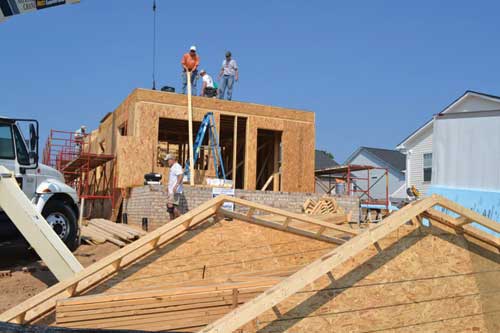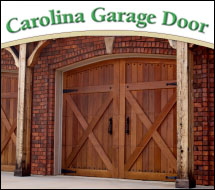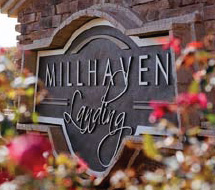Jimmy Johnson’s Labor Day Habitat Blitz

by Rachel Baron
An opportunity to show that women can operate power tools as well as men. A few days of team-building for people who normally spend their days working in an office. A way to honor a deceased fellow employee.
The Jimmy Johnson Labor of Love Blitz, held each year by Habitat for Humanity of Forsyth County, takes place on the days leading up to the Labor Day holiday. This year’s build meant different things for different people, but everyone who participated had at least one goal in common: helping local working families achieve the dream of owning a quality home in a safe neighborhood.
For the first time this year’s blitz, which took place Aug. 31-Sept. 3, was spread over two neighborhoods. The homes being built included the Women Build House, built almost entirely by local women; the Targacept and Wake Forest University houses, built by employees of those two organizations; a house built by members of the Habitat Young Professionals group; and the John Henry Myers House, built by Landmark Builders and their subcontractors in honor of the late John
Henry Myers.
James and Lisa Myers, John’s brother and sister, spearheaded the build and asked Landmark to participate. “John loved building; he was always building something,” said James Myers. “He had worked on several Habitat houses in the past, and he felt strongly about the benefits of home ownership. We felt that building a Habitat house was a wonderful way to honor his memory.”
John’s co-workers at Landmark, and the company’s subcontractors, were very receptive to the idea, said Jim Ruffin, executive vice president of Landmark. “John was very important to us. He impacted a lot of people both inside and outside of Landmark, including our subcontractors,” Ruffin said.
The John Henry Myers House was one of four started in the Smith Farm neighborhood off Kernersville Road. Four more houses were started at Trent Hill, a neighborhood north of downtown Winston-Salem. Both Smith Farm and Trent Hill are residential neighborhoods that were started by a private developer who went into bankruptcy, leaving some construction sites with only a foundation poured and other lots totally vacant.
In partnership with the City of Winston-Salem and Forsyth County, and using grant funds from the federal Neighborhood Stabilization Program, Habitat purchased the empty lots and partially finished houses, said Sylvia Oberle, executive director of Habitat Forsyth. “This arrangement allowed us to put Habitat families in new homes, but it also helps stabilize the entire neighborhood and allows the existing homeowners to preserve the value of their homes,” Oberle said.
So far, Habitat has built seven homes in Smith Farm and will build 11 more, including the four started during the Labor of Love blitz. In Trent Hill, Habitat has built six homes and will build 16 to 17 more, including the four started during the blitz. In partnership with the Forsyth County Cooperative Extension Office, Habitat is also teaching homeowners how to grow and maintain a community garden in Trent Hill; a similar project may take place at Smith Farm.











































































